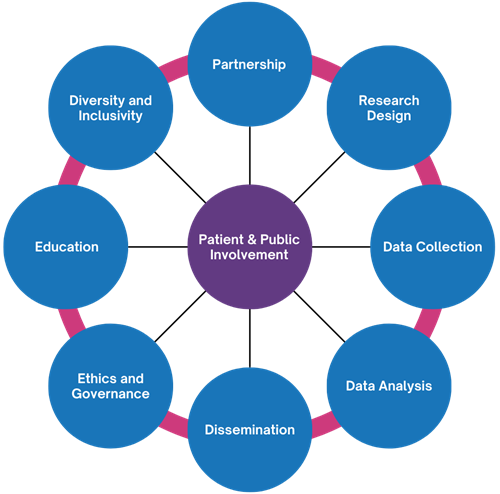
What is Patient and Public involvement (PPI)?
Patient and Public Involvement (PPI) in research is a process that involves actively engaging patients, service users, and members of the public in various stages of the research process. For us, that's making sure people living with Crohn's and Colitis can share their insights and experience to help shape and direct research.
The main goal of PPI is to ensure that research is more relevant, meaningful, and beneficial to the people it ultimately affects. PPI is often used in healthcare and medical research in particular.
PPI is the philosophy that research is carried out ‘with’ or ‘by’ members of the public rather than ‘to’, ‘about’ or ‘for’ them. PPI does not refer to the recruitment of participants to a study/medical research/clinical trial.
Here are some key aspects of Patient and Public Involvement in Research
 |
|
Be Visible – Egality film
Representation is crucial in health research — without it, healthcare treatments and services may not be as safe, accessible, or effective for underrepresented groups. Your involvement in our research means we’re focusing on what’s important to everyone affected by Crohn’s and Colitis.
To address this, we have partnered with other health charities to create a compelling film that highlights the importance of diversity in research. This spoken word film explores why involving people from diverse ethnic backgrounds in Patient and Public Involvement (PPI) is essential for improving health treatments and services for everyone.
If this has inspired you, take a look at our current opportunities to get involved with research on our Take Part in Research and Shaping Research web pages.
You can also watch the recording of our Patient Involvement in Research Day 2024 which took place in November: IBD patient involvement in research day 2024
PPI is based on the principle that involving those who will be directly impacted by research leads to more relevant, ethical, and high-quality research. It helps ensure that research addresses real-world issues and improves the overall quality of research outcomes. Additionally, it promotes transparency and trust between researchers and the communities they serve.
At Crohn's & Colitis UK, we help people living with IBD to get involved via our Shaping Research Opportunities and our Research Champions programme. We also expect researchers who apply to us for grant funding to have involved, or have a plan to involve people with Crohn's or Colitis in their projects.
Get involved with research
Researchers and Healthcare Professionals
If you are a researcher and/or a healthcare professional more resources are available.
Helpline
Service
We know it can be difficult to live with, or support someone living with these conditions. But you’re not alone. We provide up-to-date, evidence-based information and can support you to live well with Crohn’s or Colitis.
Our helpline team can help by:
-
Providing information about Crohn’s and Colitis.
-
Listening and talking through your situation.
-
Helping you to find support from others in the Crohn’s and Colitis community.
-
Providing details of other specialist organisations.
Please be aware we’re not medically or legally trained. We cannot provide detailed financial or benefits advice or specialist emotional support.
Please contact us via telephone, email or LiveChat - 9am to 5pm, Monday to Friday (except English bank holidays).
If you need specific medical advice about your condition, your GP or IBD team will be best placed to help.
 Patient Involvement in Research Day
Patient Involvement in Research Day
 Patient and Public Involvement Training
Patient and Public Involvement Training
 Shaping Research
Shaping Research
 Research Champions
Research Champions